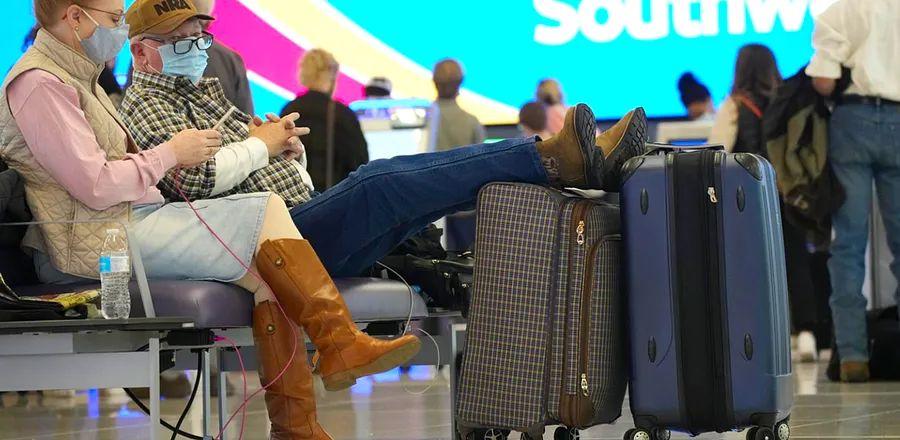Reasons Behind Airlines Cancelling Hundreds of Holiday Flights

Airlines persisted in canceling hundreds of flights on Saturday due to staffing challenges related to COVID-19, disrupting holiday festivities during one of the peak travel seasons of the year.
FlightAware, a flight-monitoring service, reported nearly 1,000 flights canceled within, entering, or departing the United States on Saturday, December 25, an increase from 690 flights canceled on Friday. Additionally, over 250 more flights were already scrapped for Sunday. FlightAware has not disclosed reasons for the cancellations.
Delta, United, and JetBlue all indicated on Friday that the Omicron variant was causing staffing issues, which led to flight cancellations. United spokesperson Maddie King noted that staffing shortages continued to affect cancellations, leaving the timeline for a return to normal operations uncertain. She described the impact of Omicron on staffing as “unexpected.” Delta and JetBlue did not provide comments on Saturday.
According to FlightAware, the three airlines canceled over 10 percent of their planned flights on Saturday. American Airlines also scrapped more than 90 flights that day, which is roughly 3 percent of its schedule, as reported by FlightAware. American spokesperson Derek Walls stated that the cancellations were due to “COVID-related sick calls.” European and Australian airlines have similarly canceled flights during the holiday season due to staffing issues linked to COVID-19.
For travelers, this meant time lost with family, airport chaos, and the anxiety of spending hours waiting in lines and on the phone to rebook flights. Peter Bockman, a retired actor, and his daughter Malaika, a college student, were meant to celebrate in Senegal with relatives they hadn't seen in ten years on Saturday. However, their 7:30 p.m. flight from New York to Dakar on Friday was canceled, which they only learned upon arriving at the airport. They remained there until 2 a.m. trying to find an alternative flight.
“There was no organization or effort to sort things out,” he remarked, criticizing Delta for poor customer service. “No one offered explanations or even expressed regret, like ‘We’re so sorry, here’s how we can assist you.’”
Their new flight is scheduled for Monday evening with a layover in Paris, and they are concerned there might be problems with that one too. They have already missed a significant family gathering that was planned for Saturday.
Data from FlightAware indicates that airlines canceled over 6,000 flights worldwide from Friday to Sunday by Saturday evening, with nearly a third of those affecting flights to, from, or within the United States. Many of the canceled flights were attributed to Chinese airlines, and Chinese airports ranked highest on FlightAware's list of cancellations. The reasons remain unclear, but China’s stringent pandemic control measures, including frequent lockdowns, were noted, with a recent lockdown announced in Xi’an, a city of 13 million.
Staff members who answered phones at customer service hotlines for Air China and China Eastern Airlines on Sunday stated they had not received any notifications about cancellations for flights to or from the United States.
Air China typically operates flights between New York City and Shanghai twice each week. China Eastern offers two weekly flights to Los Angeles, one departing from Beijing and the other from Shenzhen. Another airline, Hainan Airlines, halted its flights to the United States early in the pandemic.
The flight schedule from the Civil Aviation Administration of China for the remainder of March indicates a total of 408 international flights planned each week, which is a 21 percent decrease compared to the previous year.
This year, the U.S. airline industry has frequently faced flight delays and cancellations due to staffing shortages. During the collapse of air travel in 2020, airlines encouraged employees to resign, resulting in a lack of staff as travel began to rebound.
To address staffing shortages, countries such as Spain and the U.K. have shortened COVID-19 quarantine periods, allowing individuals to return to work sooner after testing positive or being in contact with someone infected.
Delta CEO Ed Bastian is among those urging the Biden administration to implement similar measures to avoid further disruptions in air travel. On Thursday, the U.S. revised COVID-19 isolation guidelines but only for health care workers.

1

2

3

4

5
Evaluation :
5/5